新概念英语第二册第一课详细优选教案.doc
新概念2册第一课教案
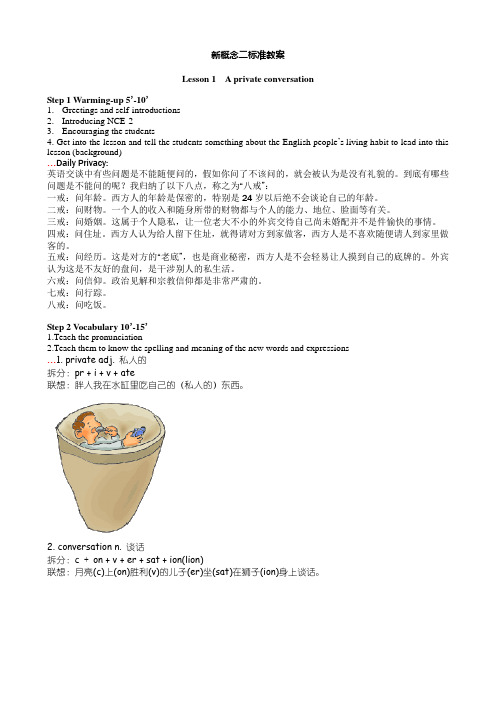
新概念二标准教案Lesson 1 A private conversationStep 1 Warming-up 5’-10’1.Greetings and self-introductions2.Introducing NCE-23.Encouraging the students4. Get into the lesson and tell the students something about the English people’s living habit to lead into this lesson (background)…Daily Privacy:英语交谈中有些问题是不能随便问的,假如你问了不该问的,就会被认为是没有礼貌的。
到底有哪些问题是不能问的呢?我归纳了以下八点,称之为“八戒”:一戒:问年龄。
西方人的年龄是保密的,特别是24岁以后绝不会谈论自己的年龄。
二戒:问财物。
一个人的收入和随身所带的财物都与个人的能力、地位、脸面等有关。
三戒:问婚姻。
这属于个人隐私,让一位老大不小的外宾交待自己尚未婚配并不是件愉快的事情。
四戒:问住址。
西方人认为给人留下住址,就得请对方到家做客,西方人是不喜欢随便请人到家里做客的。
五戒:问经历。
这是对方的“老底”,也是商业秘密,西方人是不会轻易让人摸到自己的底牌的。
外宾认为这是不友好的盘问,是干涉别人的私生活。
六戒:问信仰。
政治见解和宗教信仰都是非常严肃的。
七戒:问行踪。
八戒:问吃饭。
Step 2 Vocabulary 10’-15’1.Teach the pronunciation2.Teach them to know the spelling and meaning of the new words and expressions…1. private adj. 私人的拆分:pr + i + v + ate联想:胖人我在水缸里吃自己的(私人的)东西。
新概念英语第二册第一课详细教案
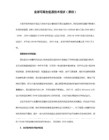
语一般为名词、代词或名词短语,通常位于动词之前。动词必须
“一致”,所以主语决定动词的单复数形式(如 I am, you are, he
。宾语一般为名词、代词或名词短语。在主动句中,宾语一般位
副词时,地点副词的一般位置是在方式副词
通常我们讲
be动词的适当形式填空。
2 / 7
Yesterday was______ the first of
All the students __are____ very excited.
______________________________________________
上教堂,去做礼拜 (cf.第1册第68课at school, at church;
1册第85课have been to school/church)
座位很好
一般指戏院、汽车等配置的固定座位,也可以抽象地表示“座位”
汽车的前座
请坐。
戏很有意思。
属于现在分词形式的形容词,意思是“使人感兴趣”。
fall sick。
4 / 7
上星期我去看戏。
句首的“Last week”点明叙述的事情发生的时间是上星期。因此整
(包括过去进行时),直接引语部分的
动词go的原义是离开一个地方去另一个地方,与介词to连用后,
请注意在以下的短语中名词前通常不加冠词:
上学
上床睡觉
1 / 7
:
( he, she, it,
,动词的词尾要加-S。(一般的动词词尾+S。以sh/ch/s/x结尾的
+es.以辅音字母Y结尾的把Y变成i,+es。辅音字母+o结尾的+es.)
新概念2第一课教案
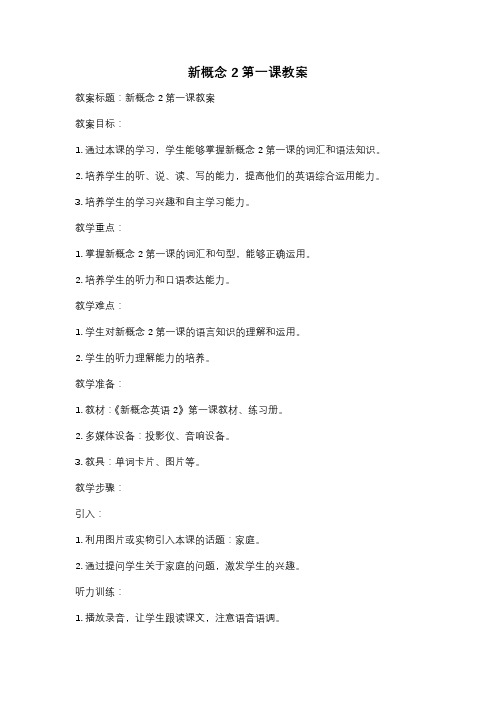
新概念2第一课教案教案标题:新概念2第一课教案教案目标:1. 通过本课的学习,学生能够掌握新概念2第一课的词汇和语法知识。
2. 培养学生的听、说、读、写的能力,提高他们的英语综合运用能力。
3. 培养学生的学习兴趣和自主学习能力。
教学重点:1. 掌握新概念2第一课的词汇和句型,能够正确运用。
2. 培养学生的听力和口语表达能力。
教学难点:1. 学生对新概念2第一课的语言知识的理解和运用。
2. 学生的听力理解能力的培养。
教学准备:1. 教材:《新概念英语2》第一课教材、练习册。
2. 多媒体设备:投影仪、音响设备。
3. 教具:单词卡片、图片等。
教学步骤:引入:1. 利用图片或实物引入本课的话题:家庭。
2. 通过提问学生关于家庭的问题,激发学生的兴趣。
听力训练:1. 播放录音,让学生跟读课文,注意语音语调。
2. 播放录音,学生听录音并完成相关的听力练习。
3. 分组进行对话练习,模仿录音中的对话内容,练习听力和口语表达能力。
语言知识讲解:1. 教师介绍本课的重点词汇和句型,并进行解释和示范。
2. 学生跟读词汇和句型,进行口语练习。
语法练习:1. 学生根据教师的指导,完成相关的语法练习。
2. 教师对学生的练习进行纠正和指导。
拓展活动:1. 学生分组进行角色扮演,模拟对话情景,练习语言交际能力。
2. 学生自由发挥,用所学知识编写小短文,展示他们的写作能力。
总结:1. 教师对本课的重点内容进行总结,并进行复习。
2. 学生进行小结,回答教师提出的问题。
作业布置:1. 布置课后作业,包括完成练习册相关练习、背诵课文等。
2. 鼓励学生自主学习,提供相关学习资源和建议。
教学反思:1. 教师对本节课的教学效果进行评估和反思。
2. 教师根据学生的反馈和表现,调整教学策略和方法。
注:以上教案仅为示例,实际教案编写时应根据具体教学内容和学生特点进行调整和完善。
新概念英语第二册第一课最全讲义
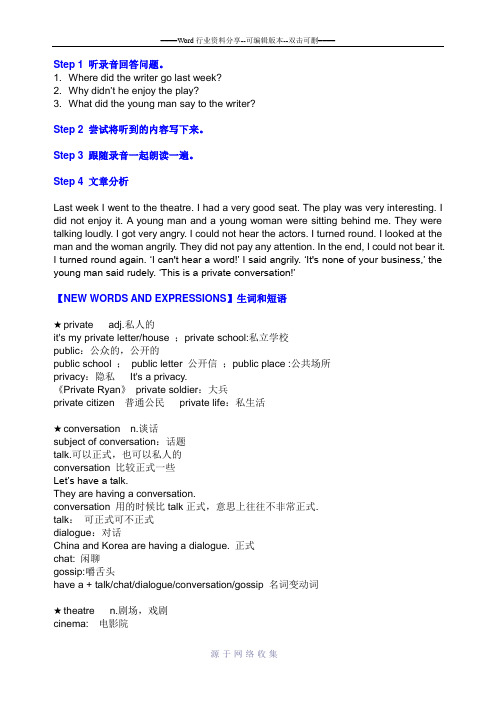
Step 1 听录音回答问题。
1. Where did the writer go last week?2. Why didn’t he enjoy the play?3. What did the young man say to the writer?Step 2 尝试将听到的内容写下来。
Step 3 跟随录音一起朗读一遍。
Step 4 文章分析Last week I went to the theatre. I had a very good seat. The play was very interesting. I did not enjoy it. A young man and a young woman were sitting behind me. They were talking loudly. I got very angry. I could not hear the actors. I turned round. I looked at the man and the woman angrily. They did not pay any attention. In the end, I could not bear it.I turned round again. ‘I can't hear a word!’ I said angrily. ‘It's none of your business,’ the young man said rudely. ‘This is a private conversation!’【NEW WORDS AND EXPRESSIONS】生词和短语★private adj.私人的it's my private letter/house ;private school:私立学校public:公众的,公开的public school ;public letter 公开信;public place :公共场所privacy:隐私It's a privacy.《Private Ryan》private soldier:大兵private citizen 普通公民private life:私生活★conversation n.谈话subject of conversation:话题talk.可以正式,也可以私人的conversation 比较正式一些Let’s have a talk.They are having a conversation.conversation 用的时候比talk正式,意思上往往不非常正式.talk:可正式可不正式dialogue:对话China and Korea are having a dialogue. 正式chat: 闲聊gossip:嚼舌头have a + talk/chat/dialogue/conversation/gossip 名词变动词★theatre n.剧场,戏剧cinema: 电影院★seat n.座位have a good seat(place)take a seat : 座下来,就座take your seat/take a seatIs the seat taken? 这个座位有人吗?no/yessit Sit down ,pleaseseat Take your seat, please.Be seated, please 更为礼貌seat是及物动词,后面有宾语sit是不及物动词,后面不加宾语seat后面会加人; seat sb; seat him; seat:让某人就座sit he is sitting there.you seat him;〖语法精粹〗When all those present__, he began his lecture.A. sitB. seatC. seatedD. were seatedsit, sit down; seat, be seated; take a seat★play n.戏★loudly adv. 大声的★angry adj. 生气的cross=angry ; I was angry. He was cross.Don't get cross with me, it wasn't my fault.不要对我生气,那不是我的错。
教案新概念英语第二册标准教案第一课
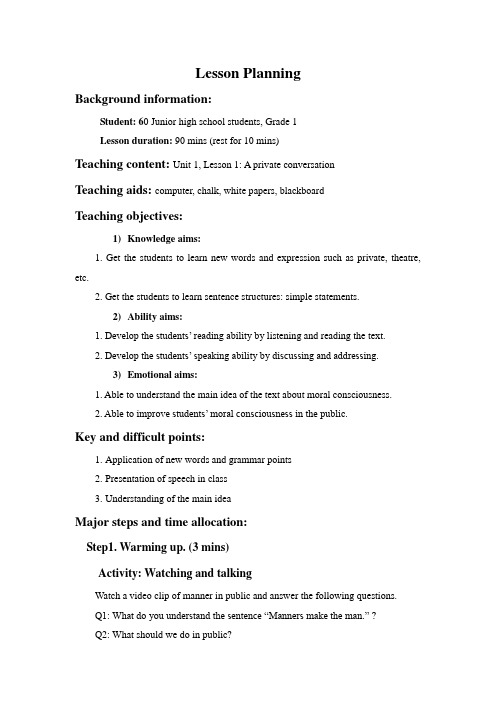
Lesson PlanningBackground information:Student: 60 Junior high school students, Grade 1Lesson duration: 90 mins (rest for 10 mins)Teaching content: Unit 1, Lesson 1: A private conversationTeaching aids: computer, chalk, white papers, blackboardTeaching objectives:1)Knowledge aims:1. Get the students to learn new words and expression such as private, theatre, etc.2. Get the students to learn sentence structures: simple statements.2)Ability aims:1. Develop the students’ reading ability by l istening and reading the text.2. Develop the students’ speaking ability by discussing and addressing.3)Emotional aims:1. Able to understand the main idea of the text about moral consciousness.2. Able to improve students’ moral consciousness in the publi c.Key and difficult points:1.Application of new words and grammar points2.Presentation of speech in class3.Understanding of the main ideaMajor steps and time allocation:Step1. Warming up. (3 mins)Activity: Watching and talkingWatch a video clip of manner in public and answer the following questions.Q1: What do you understand the sentence “Manners make the man.” ?Q2: What should we do in public?Step2. Pre-reading. (3 mins)Activity: Listening.Listen to the tape and then answer the question.Q: Why did the writer complain to the people behind him?Step3. While-reading. (10 mins)Activity 1: Skimming. (4 mins)Read the whole text and answer the following questions.Q1: What is the writing style of the text, narrative writing or descriptive writing?Q2: What is the general idea of the text?Activity 2: Scanning. (6 mins)Scan the text and complete the following tabulation.6 1 2 3 4 5 6When? Who?which?what? Action Who?which?what?How? Where? When?Last week I went to thetheatreI had a verygood seatThe play was veryinterestingI did notenjoythe playA young man and a young womanweresittingbehindmeThey weretalkingloudlyActivity 3: Close reading. (24 mins)1)Vocabulary and phrase.private adj.私人的conversation n.对话theatre n.戏院attention n.注意bear v.容忍turn round 转身pay attention注意none of your business不关你的事2)Sentence structures.1.Simple statements: A statement that tells us about one thing is a simple statement.2.Word order of simple statements: The order of words in a statement can affect the meaning of the statement.3)The tense.1.the past tense2.past continuous tense3.the present tense4)Main idea .Summarize the main idea of this text: Good manners in public are very important.Have a short break. (10 mins)Step4. Post-reading. (38 mins)Activity1. Make a short speech. (15 mins)Make a short speech about manners in public according to the following key words:speak loudly, rudely, knock at the door, spit, smoke, lady first...Activity2. Group work. (10 mins)Discuss with your partner “What did you do yesterday after school?”Use the simple statement to express your idea with right tense.Activity3. Exercise. (13 mins)Do exercise B on your textbook and then we will check it.Homework. (2mins)Finish the rest of exercises on your textbook and preview the next text.。
新概念第二册第一课教案

新概念第二册第一课教案教案标题:《新概念第二册第一课教案》教案目标:1. 通过本课的教学,学生能够掌握并正确运用本课所涉及的词汇和语法知识。
2. 培养学生的听、说、读、写能力,提高他们的英语综合运用能力。
3. 培养学生的合作意识和团队精神,通过小组活动促进学生之间的互动与合作。
教学重点:1. 通过听力训练,学生能够理解并正确运用本课所涉及的词汇和语法知识。
2. 通过口语训练,学生能够流利地表达自己的观点和意见。
3. 通过阅读训练,学生能够理解并运用本课所涉及的词汇和语法知识。
4. 通过写作训练,学生能够独立撰写一篇关于自己的家庭的短文。
教学准备:1. 课件、录音机、幻灯片等教学辅助工具。
2. 学生练习册、课本及相关教材。
3. 学生小组活动所需的材料。
教学过程:Step 1: 导入 (5分钟)1. 利用图片或实物引入本课话题,激发学生的学习兴趣。
2. 利用问题导入,如“你家有几口人?你们都住在一起吗?请介绍一下你的家庭。
”Step 2: 听力训练 (15分钟)1. 播放录音,让学生跟读并理解录音中的对话内容。
2. 分组进行听力练习,要求学生能够听懂并回答与家庭成员相关的问题。
3. 教师讲解并操练本课所涉及的词汇和语法知识。
Step 3: 口语训练 (15分钟)1. 学生分组进行角色扮演,模拟对话中的情景,练习表达自己的家庭情况。
2. 教师引导学生进行问答练习,加深对话内容的理解并提高口语表达能力。
Step 4: 阅读训练 (15分钟)1. 学生独立阅读课文,理解并标记重点词汇和句子。
2. 学生小组合作,回答与课文内容相关的问题,加深对课文的理解。
Step 5: 写作训练 (15分钟)1. 学生根据所学内容,独立撰写一篇关于自己家庭的短文。
2. 学生小组互相交换并修改彼此的短文,提高写作质量。
3. 部分学生上台展示自己的短文,进行同伴评价和教师点评。
Step 6: 小结与延伸 (5分钟)1. 教师对本课内容进行总结,并强调学生在学习过程中的进步和发现。
新概念2第一课教案
Lesson 1 - A private conversation一、教学重点1、句法:简单陈述句的句子成分(故事六要素)。
3、习语:I can not bear it! It’s none of your business!二、教学步骤【第一节课】1、引入话题(详见右框)。
2’2、听一遍音频,掌握大意。
1’①Where did the writer go last week?②Why didn’t he enjoy the play?③What did the young man say to the writer?3、生词解读,纠正发音(详见课本)。
5’4、提问:Why did the writer complain to the peoplebehind him? 看一遍视频,解答问题。
2’(屏幕升起)5、精讲课文,板书和笔记(详见下文)。
20’6、文化背景(详见下文)。
2’7、再听一遍音频,逐句跟读。
3’8、学生自己大声朗读。
5’(课间时可让学生先看看15页的两道选择理解题)【第二节课】1、做15页的两道选择理解题(详见课本)。
5’2、检查朗读,一起朗读,注意每一句话。
10’3、讲解简单陈述句的概念(详见下文)。
5’4、游戏:讲故事的六要素(详见下文)。
15’5、练习分析课文中每句话的要素构成。
5’6、做14页的排列句子成分练习题。
7’7、做15页最后一道句子结构题(详见课本)。
3’【第三节课】(屏幕放下)1、超级情景背诵图讲解。
5’2、背课文比赛。
20’3、听一首英文歌曲《I believe I can fly》。
7’4、听写单词,记忆法指点。
10’5、总结本课出现的三种时态:一般过去时、过去进行时、一般现在时(详见下文)。
5’6、总结本课重点,让学生标注(详见上文)。
2’7、布置作业:摘要写作,15页的选择题,背课文和单词。
1’三、精讲课文1、Last week 上周。
这个词组奠定了本课用一般过去时的基础。
新概念英语第二册第一课教案-Lesson1
• ★business n. 事, 生意 • ① n. 生意 business man :生意人/do
business: 做生意 go to some place on business:因公出差 • ② n. 某人(mǒu rén)自己的私人的事情 • It's my business. • It's none of your business. 不关你的事。
定句中)
• She eats too fast. I can’t bear to watch/watching her.
• How can you bear living in this place?
• bear =stand =put up with I can't
精品PPT
• endure:忍受,容忍、put up with :忍受 • I got divorced(离婚).I could not put
began his lecture.
• A. sit B. set C. seated D. were seated
• sit down 坐下;be seated=take a seat
精品PPT
• ★angry adj. 生气的 • ★angrily adv. 生气的 angry =cross • I was angry. /He was cross. • annoyed: 恼火(nǎohuǒ)的;
义词) • public school 公立学校(ɡōnɡ lìxué
xiào) public letter 公开信 • public place 公共场所 privacy n.隐私 • It’s my privacy. 这是我的隐私!(不愿让
新概念第二课(第一课时)教案(精选五篇)
新概念第二课(第一课时)教案(精选五篇)第一篇:新概念第二课(第一课时)教案新概念第二册第一课《A Private Conversation》教案教案设计设计人:赖老师课题:A Private Conversation 课时:第一课时(40min),新授课(阅读)教学目标:1.熟读课文,掌握课文中的词汇与短语;2.了解在剧院看戏礼仪,培养良好情操。
教学难点:1.回顾与复习一般过去时;2.用英语话概况课文主要内容;3.go to the theatre 与 go to theatre的区别。
教学案例:T(T eacher)Ss(Students)T: Good afternoon, students!Do you like watching movies or plays? 大家喜欢看电影或者戏剧吗?Ss: Yes!T:(To show the posts of the latest movies)T: We call these “movie”.(T o learn the new word)Ss:(T o read after the teacher)T:(To show the posts of the four classical plays in Broadway)We call these “plays”.Ss:(To read after the teacher)T: Where do we watch the movies? Ss: 电影院、剧院T: cinema,theatre Ss:(To read after the teacher)T:(To introduce the Broadway)T: If we speak loudly in the theatre how would the other audiences think of us? 如果我们在剧院里面大声喧哗,周围的观众会怎么样看待你呢?Ss: 生气!会觉得你素质低!T: So everyone knows that the bad manner would bother the others, right? So the word “生气”in English we call “angry”.Ss:(To read after the teacher)T:(To learn and read thenew words and expressions)Ss:(To read after the teacher)T: Before reading our context, let’s think about these questions.The first, where did the writer go last week? The second, why did the writer complain about the people behind him? The third, what did the young man say to the writer? T:(To read the context or play the tape)T:(To ask volunteers to answer the questions)Ss: …… T: 我们想想课文中的第一句go to the theatre是什么意思? Ss: 嗯,应该是“去戏院”的意思。
第1课裕兴新概念英语2备课教案LESSON1.docx
NEW CONCEPT ENGLISH <2>备课教案教师:陈淑娟2014-3Lesson 1 A private conversation 私人谈话New words and expressions★private adj.①私人的(personal)a private conversation 私人谈话a private company 私有公司a private life 私生活a private secretary 私人秘书private affairs 私事儿eg. That is for your private ear.这是说给你一个人的密。
②秘密的(secret)a private place 一个秘密的地方a secret place 一个秘密的地方★conversation n.谈话谈话:talk; say; speak; chat; discuss; gossip conversation n.非正式谈话(an informal talk) have a conversation with sb 跟某人谈话eg. I had a quiet conversation with my closest friend.我跟我最好的朋友进彳亍了密谈。
eg. I saw him in conversation with a friend.我看见他在和一个朋友谈话。
eg. No conversation while I'm talking.我讲话的时候不要谈话。
相关短语:1) converse (不及物动词)v. converse with sb 跟某人谈话2)talk n./v. talk with/to sb 和某人谈话talk with/to sb about sth 跟某人谈论什么事情3)say vt. say sth 说了一些话eg. He said nothing.他什么也没说。
- 1、下载文档前请自行甄别文档内容的完整性,平台不提供额外的编辑、内容补充、找答案等附加服务。
- 2、"仅部分预览"的文档,不可在线预览部分如存在完整性等问题,可反馈申请退款(可完整预览的文档不适用该条件!)。
- 3、如文档侵犯您的权益,请联系客服反馈,我们会尽快为您处理(人工客服工作时间:9:00-18:30)。
第一课 A private conversation课文:Last week I went to the theatre. I had a very good seat. The play was very interesting. I did not enjoy it. A young man and a young woman were sitting behindme. They were talking loudly. I got very angry. I could not hear the actors. I turnedround. I looked at the man and the woman angrily they did not pay any attention. Inthe end, I could not bear it. I turned round again.“ I canidangrily’thear. a word“ It ’ s none of your business” , the young man said rudely,“ This is conversation!”*本课重点语法:一般过去时、过去进行时英语的时态细分共有 16 种,其中较多用的为 9 种:第一课分析其中三种:一般现在时,一般过去时和过去进行时一般现在时是用来表示:经常、反复或是习惯性发生的动作,如I go to work at 0900 every day. 我每天 9 点钟上班。
She does not take dinner on Sundays.她周日晚上都不吃晚餐。
某种事物目前存在的情况或状态,如 There are 16 cabins available on ClassicaFeb 18 dep. 目前经典号 0218 航次剩余 16 个舱位。
表示主语的习惯、能力、职业、特征等,如 Sunwen works as a salesmanager in Costa, he has rich experience.有时间规律发生的事件或是不受时间限制的客观事实,如The earth movesaround the sun. 地球绕着太阳转。
5.表示格言或警句中。
Pride goes before a fall. 骄者必败。
Practicemakes perfect.一般现在时的构成 :一般现在时用行为动词的原形,当主语为第三人称单数时( he, she, it, name),动词的词尾要加 -S。
(一般的动词词尾 +S。
以 sh/ch/s/x 结尾的词 +es.以辅音字母Y结尾的把 Y 变成 i,+es。
辅音字母 +o 结尾的 +es.)一般现在时的疑问句助动词 DO 或 Does+主语+动词原形+其它成分。
如Do I look okay? 我看起来还行吗?Does she speak English?她学英语吗?练习翻译句子克拉拉是 Classica的控舱主管(两种)一般过去时表示过去某个时间发生的动作或存在的状态,通常我们讲述一件过去发生的事情会用这个时态。
练习:用 be 动词的适当形式填空。
1.I __am____ an English teacher now.2.She __was__ happy yesterday.3.They __were_____ glad to see each other last month.4.Helen and Nancy ____are____ good friends.5.The little dog ____is_ two years old this year.6.Look, there ____is____ lots of grapes here.7.There ______is__ a sign on the chair on last Monday.8.Today __is___ the second of June. Yesterday was______ the first of June. It ___is__ Children’AllsDaythe.students __are____ very excited.二、句型转换。
There was a car in front of the house just now.否定句: ______________________________________________一般疑问句: ___________ 肯定回答: ___________否定回答: __________2 They played football in the playground.否定句: ________________________________________________三、用所给动词的适当形式填空。
1.I ______ (watch) a cartoon on Saturday.2.Her father _______ (read) a newspaper last night.3.We _________ to zoo yesterday, we _____ to the park. (go)4.______ you _______ (visit) your relatives last Spring Festival?5.______ he _______ (fly) a kite on Sunday? Yes, he ______.6.Gao Shan _______ (pull) up carrots last National Day holiday.7.I ____________ (sweep) the floor yesterday, but my mother ______.8.What _____ she _____ (find) in the garden last morning?She ____ (find) a beautiful butterfly.9. It ____ (be) Ben’ s birthday last10Friday.We all ___ (have) a good time last night.11.He _____ (jump) high on last Sports Day. 12. Helen ____ (milk) a cow on Friday.13.She likes ______ newspapers, but she ______ a book yesterday. (read)14.He _______ football now, but they _______ basketball just now. (play)15.Jim ’ s mother _________ (plant) trees just now.16._______ they ________ (sweep) the floor on Sunday? No, they _____.17.I _______ (watch) a cartoon on Monday.去行表示去某个点正在行的状或作,用法是描述一件事生的背景;一个作生的候,另一个短作生,通常会有状如My brother fell while he was riding his bicycle and hurt himself.It was raining when they left the station.When I got to the top of the mountain, the sun was shining.典型例1) Mary ___ a dress when she cut her finger.A. madeB. is makingC. was makingD. makes答案 C. 割手指是已生的事情,用去。
同,when表的同性, "在做衣服 " 提供事情生的背景,因此用去行。
2) As she ___ the newspaper, Granny ___ asleep.read; was falling B. was reading; fell C. was reading; was falling D. read;fell答案 B.句中的 as = when, while,意 "当⋯⋯之 " 。
描述一件事生的背景,用去行;一个作生的候,另一个短作生。
句意 "在她看,奶奶睡着了。
"句中的 fell (fall 的去 ),是系,后跟形容,如: fall sick。
练习:写一篇短文,描述一下这周发生的事情。
要求用到今天讲的三种时态,副词形容动词。
st week I went to the theatre. 上星期我去看戏。
(1)句首的“ Last week点明”叙述的事情发生的时间是上星期。
因此整篇课文的时态基本上应是过去时 (包括过去进行时 ),直接引语部分的时态除外。
(2)动词 go 的原义是离开一个地方去另一个地方,与介词 to 连用后,常加上主语所要去的目的地来代表主语的动作目的。
9.请注意在以下的短语中名词前通常不加冠词:go to school 上学go to bed 上床睡觉go to church 上教堂,去做礼拜 (cf.第 1 册第 68 课 at school, at church;第 1 册第 85 课 have been to school/church)2.had a very good seat 座位很好seat 一般指戏院、汽车等配置的固定座位,也可以抽象地表示“座位”或“位子”的概念:the front seat of a car 汽车的前座Take a seat, please. 请坐。
3.The play was very interesting. 戏很有意思。
interesting 属于现在分词形式的形容词,意思是“使人感兴趣”。
它通常与非人称主语连用或修饰某个事物:This is an interesting book/idea.这是一本有趣的书 / 一个令人感兴趣的主意。
4.⋯ were sitting behind me. They were talking loudly. 坐在我的身后,⋯⋯大声地着。
两句的去行。
(cf.第 7 法 )5.I got very angry. 我得非常生气。
